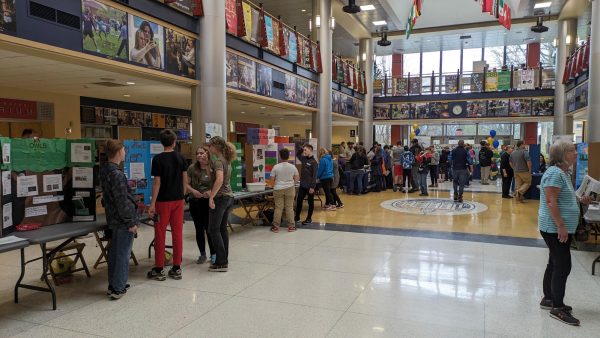Get to know a club
WARC-FM gives community outlet of expression
Radio has changed drastically over the last half-century in terms of both content and popularity. New music genres were born, others died out, Spotify was invented and the overall appeal of the platform gradually lost its prominence to television and Internet services.
Despite these shifts, Allegheny College’s WARC-FM has remained, continuing to provide the campus community with a unique pathway to self-expression, all while sustaining the joviality akin to that classic radio-culture vibe.
First airing in 1963, WARC is a nonprofit, student-run radio station located in the Henderson Campus Center that currently offers 45 shows per week, involving discussions and a diverse selection of music hosted by both student and faculty DJs.
The WARC team takes a hands-off approach when it comes to the content of the shows, giving DJs freedom to design their own platform to express themselves originally.
“At a lot of schools there are rules for what you can play, like you can’t play top 40s, you can’t play oldies or anything like that,” said WARC President Emily Greene, ’19. “So I think it’s a really unique experience that a lot of people don’t get the opportunity to do on their own campus. We don’t have any rules on what people are supposed to do, so that they can design their own radio experience.”
Although the DJs have more creative freedom, they must still adhere to guidelines.
“Every DJ has their own show and can do whatever they want as long as it’s within (Federal Communications Commission) guidelines,” said WARC Program Director Grace Rohaley, ’20. “Everyone loves music, and everyone has a different opinion of different genres and what they want to listen to, so being able to just play that over the air is really something special.”
Being a nonprofit station gives WARC the ability to escape the conventional business dynamic most stations have, where commercial interests dictate the content of shows and place DJs under pressure with strict emphasis on goals such as drawing in a large number of listeners and profiting from ad revenue.
“I think it’s a great outlet for any kind of emotion that people have, and it’s a great period to relax in whatever somebody’s sense of relaxation is,” Rohaley said. “When you’re on air, and you’re promoting or talking and doing something that you want to, it’s a lot more relaxing than working all the time, so it’s a good break.”
Other than broadcasting, WARC also moves beyond the studio and makes efforts to bring live music to Allegheny by reaching out and contracting artists to perform on campus.
“We do a lot of booking and we have a really active booking agent right now which is awesome,” Greene said. “That’s a big part of what we do in just trying to bring new music to the masses that they would be interested in.”
Greene recalled that one of her favorite WARC concerts was when Matthew Danger Lippman, who is expected to return to campus sometime this year, came to do a house show at the Theta Chi house.
“He was wearing an American flag thong and no shoes … which was bonkers,” Greene said. “But that was a really fun one.”
WARC’s influence also spreads beyond the confines of campus, as a few shows have been popular among the greater Meadville community. Greene said one such show is hosted by Christopher Lundberg, instructor of mathematics and biology.
The show is called “Eclectic Themes” and takes a different theme each week to structure discussion and an accompanying music selection. Listeners can send in to guess the theme and, if they are the first to guess correctly, can choose an organization associated with the theme that Lundberg will then make a donation to.
“WARC is really important to a lot of people; there are a lot of people who do it from their first semester to their last semester,” Greene said. “So it’s really nice to know that we run a club that people really love and stick with.”
Even with the changes radio has undergone, WARC offers a new structure to an isolated medium, according to Greene, and with its unique leadership dynamic, the station has made progress in fostering an open and inclusive atmosphere as it brings the community together.






